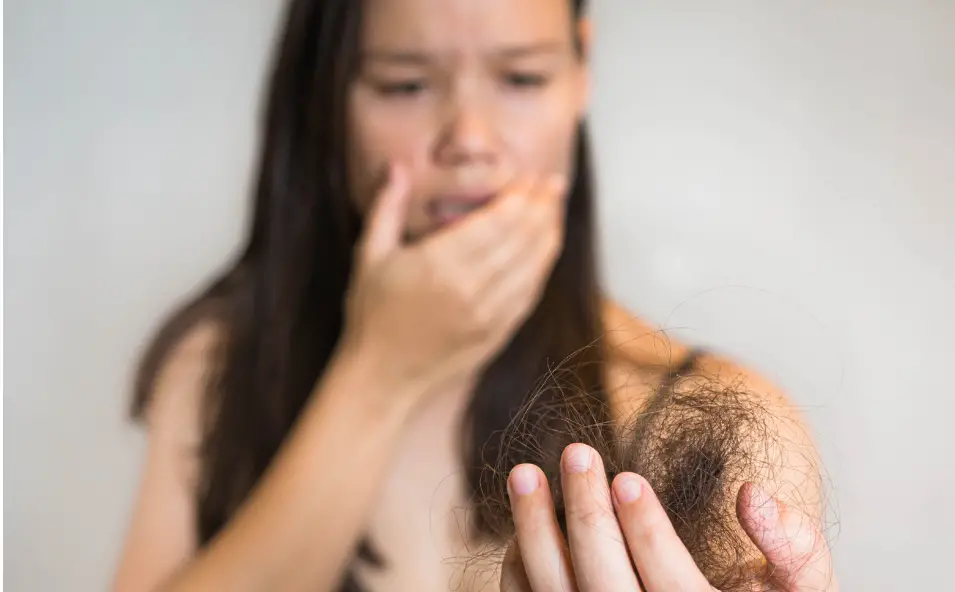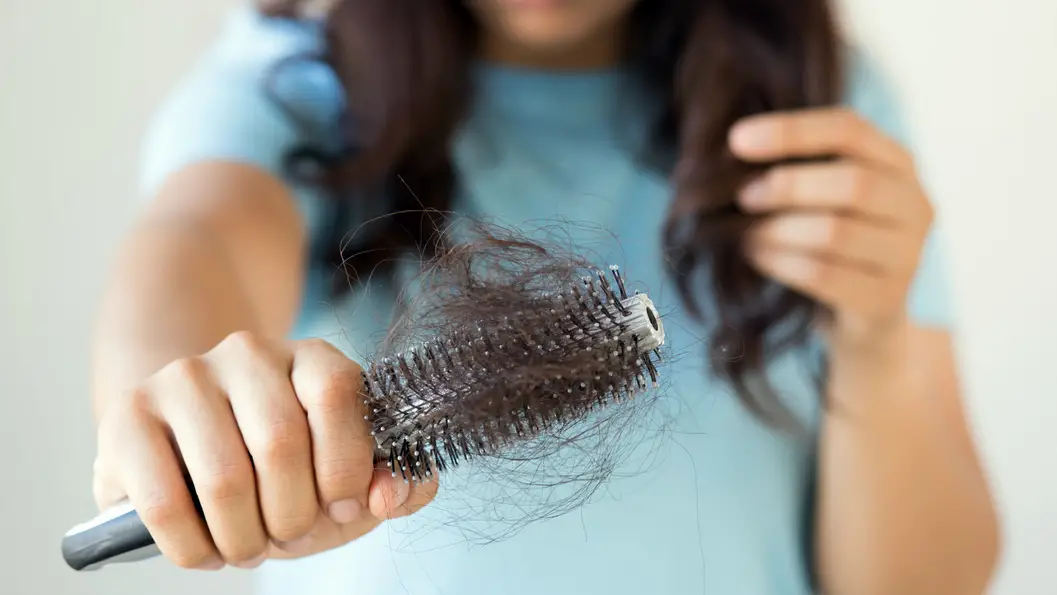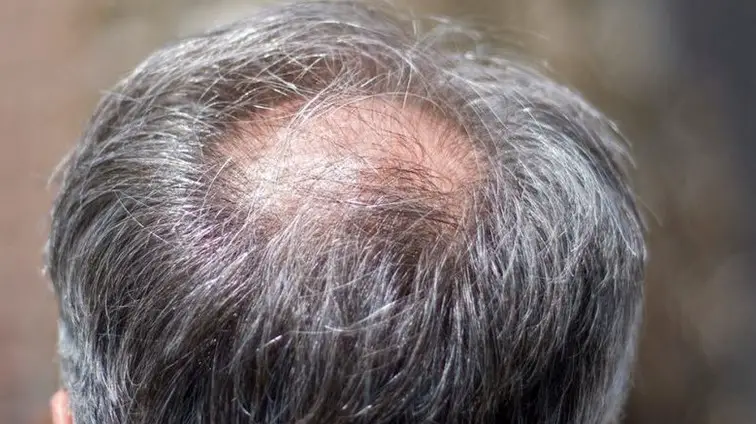Do you have thinning hair or a receding hairline? Have you been diagnosed with telogen effluvium? If so, you may be wondering if it is reversible and how to reverse telogen effluvium. Well, the good news is that telogen effluvium is in fact reversible and there are several treatments available that can help you grow hair. In this blog post, we will discuss what telogen effluvium is, why it occurs, and the various ways you can reverse it.
Understanding the Hair Growth Cycle
Understanding the Hair Growth Cycle [1] can grant you insight into hair loss causes and how to manage them. This can also help you keep your hair healthy and growing. We will now share our experience with you on the different stages of the cycle and how to reverse Telogen Effluvium.
Anagen or Growth Phase
Know the three phases of hair growth: anagen, catagen and telogen.
- Anagen is the active growth stage. Hair can grow up to ½ inch a month and last 2-7 years.
- Catagen is the transition period. Hair growth slows down and the follicle shrinks. This phase is brief, only lasting two weeks.
- Telogen is the resting phase. Hair falls out and new hair grows. This phase is 2-4 months long.
- Telogen effluvium is temporary hair loss caused by stress, trauma or hormones. Fortunately, it’s reversible.
Take care of your hair by eating right and reducing stress to prevent hair loss.
Catagen or Transitional Phase
The catagen phase is important in the hair growth cycle. The hair follicle reduces in size and detaches from the dermal papilla. This results in a club hair forming. It’s essential to understand the catagen phase to diagnose abnormal hair loss. Dermatologists use medical history, nutrition, scalp examination and gentle hair care to spot hair loss.
The catagen phase is one of three phases that make up the hair growth cycle. To counter telogen effluvium, stress management, hormone therapy and hair growth supplements like minoxidil are used. Maintaining healthy hair during this phase may be aided by cutting hair or using gentle hair care products. Pro tip: If your hair loss persists for more than six months, consult a dermatologist for treatment.
Telogen or Resting Phase
The Telogen or Resting Phase is when hair follicles are inactive and growth stops. To reverse Telogen Effluvium, a common type of hair loss with symptoms such as shedding, thinning, and bald patches, understanding the phase is key. Causes vary from hormonal functions, nutrition deficiencies, stress, and medications.
Diagnose Telogen Effluvium with hair pull tests, haircuts, and medical tests. Nutrients like zinc, vitamins, minerals, and protein can prevent the condition, so a healthy diet is important. Treatments like hormone replacement therapy, minoxidil, and other solutions can help promote growth.
To sum up, knowledge of the Telogen or Resting Phase is necessary to reverse Telogen Effluvium and have great hair. And for extra help, make sure to lead a healthy life and lower stress levels.
Types of Telogen Effluvium
Telogen Effluvium [2] is a common hair-loss condition. It affects both men and women, of all ages. To understand it, one must identify the types of Telogen Effluvium. This helps to identify the causes and treat the condition. To do so, seek a healthcare professional.
After identifying the type of Telogen Effluvium, you can begin reversing it:
Chronic Telogen Effluvium
Chronic Telogen Effluvium is a type of hair loss. It affects the hair cycle, causing thinning and shedding. It’s one of the most common types of Telogen Effluvium. It usually happens after stress or nutritional deficiencies. It’s a temporary form of hair loss, and it can be reversed with the right treatment. Clumps of hair may fall, but it will grow back.
Zinc is a key nutrient for hair regrowth and recovery. Currently, there is no cure for Telogen Effluvium. But, it can be managed with the right approach. If you’re suffering from hair loss, see a doctor and create a plan specific to you. Pro tip: To regrow your hair, add zinc-rich foods or supplements to your routine.
Acute Telogen Effluvium
Acute Telogen Effluvium is a form of hair loss that can affect both men and women. Stress, hormones or a shock to the body can cause it. A dermatologist can diagnose it and suggest treatment.
Telogen Effluvium is the second most common form of hair loss. It happens when follicles enter the telogen phase. Most people don’t lose all their hair. Shedding stops when the cause is addressed.
Managing Telogen Effluvium?
- Reduce stress.
- Eat a balanced diet.
- Take zinc supplements.
- Minoxidil treatment may help maintain and stimulate hair growth.
- Speak to a derm to decide the best treatment.
Pro tip: Be gentle with your hair. Avoid tight hairstyles. Use mild, sulfate-free shampoos. Prevent damage.
Who is at Risk of Getting Telogen Effluvium?
Telogen Effluvium is a common hair loss condition. It causes clumps of hair to fall out from the scalp. Stress, either physical or emotional, can trigger it. Knowing who is at risk of this condition can help with prevention.
Factors that can increase the likelihood of developing Telogen Effluvium include:
- Hormonal imbalances
- Certain medications
Symptoms of Telogen Effluvium
Symptoms of Telogen Effluvium are major signs of this type of hair loss. Knowing the symptoms helps people spot Telogen Effluvium early. This allows them to take steps to stop more hair loss. By recognizing the initial symptoms of Telogen Effluvium, individuals can get help to reverse it and grow more hair.
Diagnosis of Telogen Effluvium
Diagnosing Telogen Effluvium is key. It can reveal the reason for hair loss and direct the right treatment. This disorder causes too much hair to fall out. Stress, hormone shifts, and nutrient shortages can set it off.
Realize the signs and get medical help. You might be able to turn around the consequences of Telogen Effluvium.
Causes of Telogen Effluvium
Telogen Effluvium is an issue that brings about thinning and balding of hair. Knowing its causes is key to treating it properly. This article will discuss the many reasons Telogen Effluvium occurs. These include:
- Stress
- Hormones altering
- Medicine
Comprehending the source can assist people take action to turn around the effects and revive healthy, full hair.
Stress
Stress can cause telogen effluvium, a type of temporary hair loss. It’s when stress causes follicles to go into the telogen phase early. This leads to shedding and thinning.
To diagnose and treat it, you must understand the symptoms and causes. Hair may stop shedding, but regrowth takes time. There are treatments like minoxidil, diet changes, and stress reduction. It is possible to recover from telogen effluvium with the right approach.
Pro tip: See a dermatologist to find the cause and get the right treatment plan.
Hormones
Hormones can have a big impact on hair growth and loss. An imbalance can cause Telogen Effluvium – a kind of temporary hair shedding. Common causes? Hormonal changes, stress and meds. But, with the right treatment, Telogen Effluvium can be reversed. Hair will stop falling out.
For managing and treating, try a balanced diet, reduce stress and use minoxidil for stimulating growth. It’s important to treat early. Avoid more thinning or balding. Pro tip: See a dermatologist for proper diagnosis & treatment. And take care of your hair with healthy habits.
Pregnancy and Childbirth
Pregnancy and childbirth can cause unexpected effects on the body- including hair loss. Telogen effluvium is a common type of temporary hair loss for pregnant women and new moms. To reverse it, it’s important to understand the causes.
Telogen effluvium happens when hair enters the telogen phase, a resting stage of the hair growth cycle. Stress, hormonal changes, and more can make the follicles enter this phase too soon, leading to hair loss. There is no known cure, but treatments can reduce the loss and help regrowth.
Pro tip: Eating healthy and reducing stress can help lessen telogen effluvium. Also, minoxidil and other hair loss treatments may be useful. Ask a healthcare expert about the best treatment for you.
Menopause
Menopause [3] is a natural biological event. It marks the end of a woman’s reproductive years and can cause physical and emotional symptoms. Hair loss is one such symptom and is caused by telogen effluvium. This is a form of temporary hair loss in the telogen phase of the hair growth cycle. It can be due to stress, hormones or genetics.
To reduce hair loss and promote regrowth, eat a healthy diet, reduce stress, and use suitable haircare products. In some cases, medication or other treatment may be needed.
Pro tip: If you’re concerned about hair loss due to telogen effluvium, talk to your doctor or a healthcare professional to decide the best treatment for you.
Poor Diet
Poor diet leads [4] to telogen effluvium, a form of hair loss that is reversible. It happens when many hair follicles enter the telogen stage simultaneously.
Eating a balanced diet full of proteins, iron, zinc and other nutrients encourages healthy hair growth and prevents telogen effluvium. Poor diets lacking these essential nutrients can cause hair to fall out and thin.
Eating healthy and incorporating stress-reduction techniques such as exercise and mindfulness can help reverse telogen effluvium and stimulate hair regrowth. A pro tip: Talk to a healthcare professional or dietitian to develop a personalized diet that meets your own nutrient needs for healthy hair growth.
Certain Drugs
Telogen Effluvium is a condition where the normal hair growth cycle is disrupted and the hair follicles enter the telogen phase, causing the hair to shed early and resulting in thinning hair or baldness.
Certain drugs can trigger this condition, such as antidepressants, blood thinners and certain chemotherapy drugs. Sometimes, changing the dosage or switching medication can reverse the hair loss. It’s important to talk to a healthcare provider to find the cause and get the right treatment.
Pro Tip: If you have hair loss, ask your healthcare provider if any medicines you take could be the cause.
Surgery
Surgery may be necessary for those with hair loss due to telogen effluvium. Telogen effluvium is a common cause of diffuse hair loss. Hair enters the telogen phase and can cause thinning or complete hair loss. Stress, alopecia, male pattern baldness, androgenetic alopecia, and more can cause telogen effluvium. No specific treatment exists, but there are tips and options to stimulate hair growth. Surgery may be an option if other treatments do not work. Consult a healthcare provider to diagnose and determine the best treatment.
Pro tip: Early diagnosis and treatment can help stop chronic hair loss.
Underlying Medical Conditions
Telogen effluvium, a common type of hair loss, can be caused by underlying medical conditions. Diagnosing and treating it involves identifying the cause, eating well, using meds or treatments, and massaging the scalp to promote growth. Some cases may be chronic and lead to thinning or complete hair loss, but many people can reverse it and regrow their hair.
To overcome telogen effluvium and enjoy healthy hair again, stay informed and seek treatment. Pro tip: Talk to a healthcare pro if worried about hair loss or other medical issues.
Metal Toxicity
Metal toxicity can lead to telogen effluvium, an excessive hair-shedding condition. Signs of metal poisoning are hair thinning, hair in the anagen phase, and decreased elasticity. Metal toxins can disrupt follicles, making them go into a resting phase that leads to hair loss. It’s one of the most common reasons for temporary hair loss.
Comprehending metal toxicity and its relationship to telogen effluvium can help with diagnosis and therapy. Consulting a doctor can determine the cause of hair loss, and provide advice for telogen effluvium. Treatment involves:
- Stimulating hair growth with minoxidil.
- Following a telogen effluvium diet.
- Using suitable therapy for chronic telogen effluvium.
Pro tip: Metal toxicity can also cause other health issues, so it is vital to detect and treat the source of toxins for overall well-being.
How to Reverse Telogen Effluvium
| Step 1: | Identify the Cause: Telogen Effluvium can be caused by a variety of factors, including stress, hormonal changes, nutritional deficiencies, and certain medications. Identifying the underlying cause is critical in developing an effective treatment plan. |
| Step 2: | Practice Good Hair Care: Avoid harsh chemicals, heat styling tools, and tight hairstyles that can further damage your hair. Instead, opt for gentle, nourishing hair care products and styles that do not place excessive tension on the hair. |
| Step 3: | Prioritize Nutrition: Eating a balanced, nutrient-rich diet can help support healthy hair growth. Focus on consuming foods high in biotin, vitamin D, iron, and other key nutrients essential for hair health. |
| Step 4: | Reduce Stress: Chronic stress can contribute to Telogen Effluvium, so it’s important to find ways to manage stress levels. Practicing relaxation techniques such as yoga, meditation, or deep breathing exercises can help alleviate stress and promote hair growth. |
| Step 5: | Consider Supplements: Certain supplements, such as biotin and iron, have been shown to promote healthy hair growth. Consult with a healthcare professional before taking any supplements to ensure they are safe and effective for you. |
| Step 6: | Try Topical Treatments: Topical treatments, such as minoxidil, can help stimulate hair growth and reduce hair loss. These treatments are available over-the-counter or by prescription, depending on their strength. |
| Step 7: | Be Patient: Telogen Effluvium is a temporary condition, and it can take several months for hair to fully regrow. It’s essential to be patient and consistent in your treatment plan, as results may not be immediately noticeable. |
Treatment of Telogen Effluvium
Telogen Effluvium can cause major hair loss. Fortunately, it’s usually temporary! With the right treatment, reversing it is possible. This article will discuss options to treat Telogen Effluvium. It will aid readers in comprehending this condition and how to handle it. With this knowledge, readers can take action to bring their hair back to its former radiance.
Options to treat Telogen Effluvium include:
- Improving nutrition
- Taking supplements
- Reducing stress
- Using medicated shampoos
- Receiving light therapy
1. Correcting Nutritional Deficiencies Through Diet
For treating telogen effluvium (a condition causing hair thinning/shedding due to stress, hormonal imbalances, or nutritional deficiencies), dietary correction of nutrient deficiencies is key. Incorporate nutrient-rich foods like leafy greens, whole grains, and lean proteins into your diet for healthy hair growth and minimal shedding.
To reverse telogen effluvium:
- Identify and address any underlying health issues or nutrient deficiencies.
- Avoid crash diets and extreme weight loss.
- Reduce stress with relaxation and exercise.
- Use appropriate hair care products.
Accurate diagnosis of telogen effluvium is necessary for proper treatment. This may include supplements, meds like minoxidil, and a healthy diet. Telogen effluvium is usually temporary, and hair will regrow when the underlying cause is addressed.
Pro Tip: Take steps to correct nutritional deficiencies and adopt a healthy diet. Patience is needed to see improvements.
2. Opt for Gentle Hair Care
Gentle hair care is essential for treating and reversing telogen effluvium. It’s a type of hair loss caused by stress, hormones, medication, or medical conditions. Telogen effluvium makes hair follicles go into a resting phase too soon, leading to thinning hair, and in severe cases, losing all of it.
Experts suggest avoiding tight styles or chemical treatments. Reduce heat-styling and use mild shampoos to avoid more damage. Treatment for telogen effluvium is available. Early diagnosis can help prevent further hair loss.
A healthy diet with vitamins and minerals such as Biotin and Zinc can help stimulate hair growth. Pro Tip: See a dermatologist for an accurate diagnosis and treatment plan for your telogen effluvium.
3. OTC Medication
Snip off the tallest stems and leave the bottom ones! That’s the way to harvest and store cilantro at home. Cut the top 1/3 of the stem, with leaves included. Leave the 2/3 of the stem and the bottom leaves alone. Repeat this process every few weeks.
For storage, rinse, pat dry the leaves and place them in an airtight container or Ziploc bag in the fridge. Your cilantro can last up to 2 weeks if stored correctly. That’s it!
4. Hormone Replacement Therapy
Hormone Replacement Therapy (HRT) can reverse telogen effluvium hair loss. This occurs when hair falls out due to stress, medication, or hormonal changes. HRT replaces lost or reduced hormones with natural or synthetic ones.
Before taking treatment, it is crucial to identify the root cause of telogen effluvium. Your doctor can advise on a treatment plan, which may include HRT. However, it is not suitable for everyone and may have side effects. Consult your doctor before taking any medication or treatment.
Pro tip: Boost your chances of reversing telogen effluvium by following a healthy diet and lifestyle, reducing stress, and using minoxidil or other hair growth products.
4. Management of Stress
Managing stress is a must for wellbeing. Stress can lead to health problems, one of which is telogen effluvium hair loss. This condition is caused by stress, medications, or hormonal changes. Tips for managing telogen effluvium can help reduce stress and aid hair growth.
- Balance your diet and exercise regularly.
- Stress reduction techniques such as meditation or yoga can assist.
- Minoxidil for telogen effluvium can also help stimulate hair growth.
- Diagnose telogen effluvium quickly to avoid further loss.
- Chronic telogen effluvium may take a long time to recover from, but once the cause is addressed, hair should start to regrow.
Pro tip: Stress management is key for overall health and preventing telogen effluvium hair loss. Try stress reduction methods and get proper treatment if hair loss continues.
You will also like: 12 Best Hairstyles & Haircuts For Balding Men
Diet for Telogen Effluvium
Telogen Effluvium is a type of temporary hair loss. It can be triggered by stress, medication, and a poor diet. To combat this problem, eating a diet rich in iron, protein, and vitamins can help reverse the condition and promote hair regrowth. Here, we’ll discuss what we’ve found to be the best diet for Telogen Effluvium.
Recovery Time for Telogen Effluvium
Recovery Time for Telogen Effluvium is important. Knowing how long it takes for the hair to grow back can give you peace of mind. We will talk about the average time frame and factors that can affect the process. This is from our own experience.
Telogen Effluvium vs Male Pattern Baldness
Telogen Effluvium and Male Pattern Baldness are often mistaken for each other. But they have distinct symptoms, causes, and treatments. To make sure you get the right help for your hair loss, you need to know the difference. This article will help you understand the distinctions between the two conditions.
Baldness from Telogen Effluvium
Telogen Effluvium can lead to baldness. It can cause sudden hair loss. To spot it early, understanding its causes and symptoms is key.
We will discuss how it leads to baldness. Plus, tips on reversing the effects. This is based on our own experience.
Recommended Products
Searching for items to reverse Telogen Effluvium’s effects? Our collection of endorsed products will make your hunt simpler. We’ve picked the leading products that have verified themselves to be successful in fixing baldness due to Telogen Effluvium. Save time and bypass the experimentation. Choose from our dependable list.
FAQs about How To Reverse Telogen Effluvium
What is telogen effluvium and how is it diagnosed?
Telogen effluvium is a type of hair loss that occurs when a large number of hair follicles go into the resting (telogen) phase of the hair growth cycle, causing thinning of hair or even losing all of your hair in some cases. Stress, poor nutrition, hormonal changes, or medication can cause this condition. A doctor may diagnose telogen effluvium by examining your scalp and reviewing your medical history.
What are the tips for telogen effluvium?
There are some tips for telogen effluvium that can help stimulate hair growth and minimize hair loss, such as reducing stress, improving nutrition, avoiding harsh hair products, and getting enough rest. You can also try stimulating hair growth with minoxidil or other appropriate treatments.
How to reverse telogen effluvium fast?
Unfortunately, there is no quick fix to reverse telogen effluvium. It can take several months for hair to grow back, and in some cases, hair loss may continue for longer periods. However, some treatments like minoxidil may help to speed up the regrowth process. Always consult with your doctor before trying any new treatment.
How to treat chronic telogen effluvium?
Chronic telogen effluvium is a long-lasting form of hair loss that is not easy to treat, and the appropriate treatment largely depends on the underlying cause. Besides addressing any underlying medical conditions, treatment options may include scalp massages, using minoxidil, and taking supplements like vitamin D and iron.
Can telogen effluvium be cured naturally?
While some natural remedies like scalp massages and dietary changes can help promote hair growth and reduce hair loss, there is no cure for telogen effluvium. Treatments like minoxidil or other medications may be necessary to reverse the condition and stimulate hair growth effectively.
Has anyone recovered from telogen effluvium?
Yes, many people have recovered from telogen effluvium. With the appropriate treatment and lifestyle adjustments, most people can regrow their hair and significantly reduce hair loss. The recovery time may vary depending on the cause and severity of telogen effluvium, but most cases resolve within several months.
- AI Powered Bald Filter Online 2024: See Yourself with No Hair! - January 19, 2024
- Harklinikken Bad Reviews 2024: Analyzing Negative Feedbacks - January 18, 2024
- How to Get the Alex Eubank Hair | Step-By-Step Tutorial 2024 - January 18, 2024








